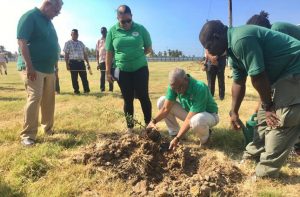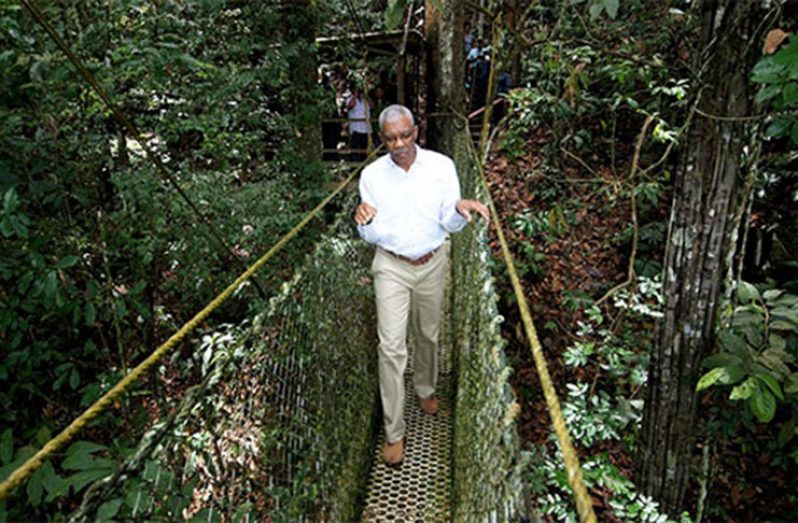A REVIEW of four books by David Granger – Air, Earth and Water: Protecting Guyana’s environment; Iwokrama: A university of biodiversity; The Green State. Environmental security and biodiversity in Guyana; and Trees: Guyana’s covenant with the earth.
David Granger, President of Guyana, has emerged as a passionate advocate for protection of the environment. The release of a collection of four books authored by him and detailing his environmental policies, cemented his reputation as an authoritative voice on the global environmental landscape.

Concise and written with clarity, the collection reproduces President Granger’s addresses to local and international audiences on Guyana’s environment from 2016 to 2019.
Air, earth and water: Protecting Guyana’s environment, the first book, constitutes the text of the President’s address on the occasion of World Environment Day on 11th October, 2019.
He made bold but controversial proposals for regulating the mining sector in a country whose main mineral export is gold. His proposals were all the more audacious, considering that he has been President for only four years and of a country which, historically, has been economically dependent on the extraction of its natural resources.
Guyana suffered mixed economic fortunes for the greater part of its pre-independence era and is considered still to be among the poorest states in the western hemisphere. The exploitation of its mineral wealth – bauxite, diamonds, gold and manganese – could offer rich rewards and a path to economic prosperity.
The adverse effects of the extractive industries on the environment, however, are no secret. Mining and logging are associated with increased deforestation the rates of which, despite being low, come with risks. The most serious of these is the pollution of the rivers and land by the deadly poison, mercury, which is widely used in the gold-mining sector.
The average politician, in the absence of a serious crisis, would hardly be inclined to undertake controversial measures, especially in an election year. But David Granger is no average politician; he has displayed pluck by placing people before profits. He is a statesman who is prepared to make difficult decisions to balance development with environmental protection and human safety.
Air, earth and water: Protecting Guyana’s environment is a small, absorbing book. It argues a cogent case for the implementation of measures to reduce deforestation and environmental pollution. Granger’s proposals demand that Guyanese, both rich and poor and, particularly, his country’s powerful loggers and miners, make hard choices in pursuing his lofty vision.
Iwokrama: A University of biodiversity, the second book, represents his address at the 30th anniversary of the Pledge of the Iwokrama International Centre for Rainforest Conservation and Development on 30th November 2019.
Iwokrama was conceived 30 years ago following the 11th Commonwealth Heads of Government Meeting in Malaysia in 1989. Hailed as Guyana’s great ‘gift to the world’, this 371,000-hectare forest concession was supposed to become a model of sustainable tropical forest management and conservation.
It has survived in relative obscurity, bedevilled by a six-year delay in signing the agreement to establish the Iwokrama International Centre for Rainforest Conservation and Development. Problems with financing, occasioned by shifting donor priorities, have slowed the centre’s growth.
Guyana is dismayed by the international community’s neglect of Iwokrama. President Granger is not a man to be discouraged easily, however; he is on a mission to protect his country’s environment. He re-conceptualises Iwokrama in this small book without straying from the centre’s original objectives. He unveils his new ‘covenant’ – one which will warm the hearts of environmentalists and students of biodiversity.
President Granger, in seeking to realise his vision for Iwokrama, knows that he will need international cooperation and must become more adept in obtaining it than his predecessors.

Guyana’s first peoples have a saying that: “Trees hold up the sky. If the trees are cut down, the sky will fall.” It is their way of reminding humanity that the planet is protected when trees are protected. Trees are all around; we often take them for granted.
Trees: Guyana’s covenant with the earth, Granger’s third book, encourages the reader to look at trees in the same way. The book – the text of an address which the Guyanese President gave on the occasion of National Tree Day on 11th October 2019 – is a stirring exposition of the immense value which trees make to human life.
Granger’s rejection of unrestricted logging sends a message to people, both at home and away: we will not cut down the country’s forests in the pursuit of profits. There is a real rejection here of absolutes – the state can achieve food security, economic prosperity, and hinterland development without mass deforestation.
The book sends a simple but stirring message: The world must first protect its trees. Saving the world begins with saving the forests and safeguarding the forests.
The Green State: Environmental security and biodiversity in Guyana is the fourth and most substantial of the four books. It is a masterful work which shifts the global environmental discourse by highlighting the underrated and undervalued role of small states in protecting the environment.
The key message of the book is that small states – particularly small-island developing and low-lying coastal states – are not mere victims of the effects of global warming but are part of the solution to arresting climate change.
The book’s publication is timely. The euphoria of the Paris Agreement of December 2015 has subsided, owing to successive failures to make substantial progress in climate negotiations. These failures have disappointed hopes for meeting the agreed targets set in Paris four years ago.
Granger’s book offers a bright and fresh approach, divorced from the commodification of environmental services and establishing rules for carbon markets. He points the world in a new direction by establishing a model of low-carbon, low-emission economies. It is the tonic needed to reboot the world’s environmental movement, wearied by recent setbacks in the ambition to stem global temperature rises.
Granger matches rhetoric with responsibility. His actions speak louder than his words. He is prepared to deploy his country’s environmental assets to help reduce the greenhouse effect, but he wishes also to ensure that human development is not imperilled. He is clear-eyed about what is to be done.
The President has set himself and his country the ambitious goal of developing what he calls a ‘green state’, one in which emphasis will be placed on conservation, the protection of biodiversity, the promotion of energy generation from renewable sources and the adoption of measures to enhance climate mitigation and adaptation.
Guyana is a leader in environmental stewardship. Guyana’s President faces a stern test in changing the development trajectory of his country, however. Transitioning to a ‘green state’ will require time, resources and a change in attitudes, no easy task for a small state still seeking to overcome the strictures of underdevelopment.
Granger, if he is successful, would have given the world a replicable model of a low- carbon state and demonstrated the vital role which small states can play in finding solutions to global problems while addressing their vulnerabilities.
The world should take heed of this new voice of environmentalism. Granger’s four-book collection is worth acquiring and reading.




.jpg)









